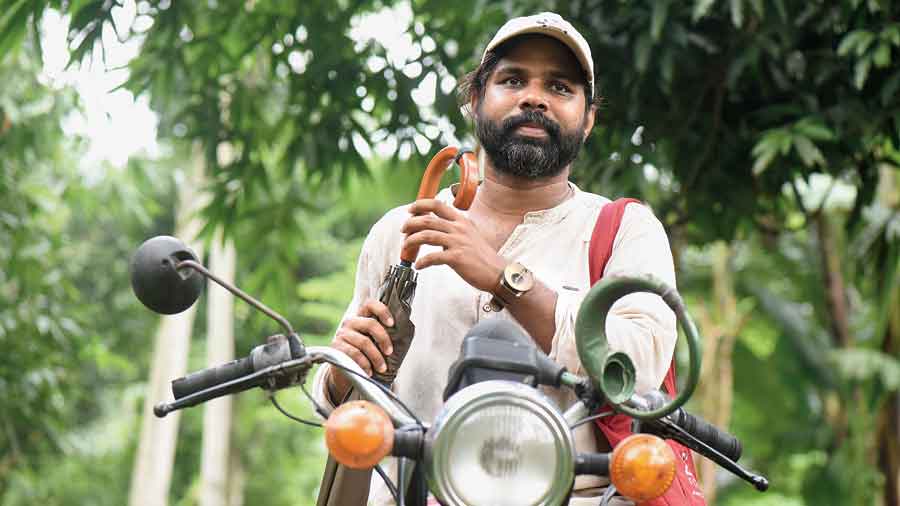THIS IS NOT A LUXURY TOUR. The warning in capital letters appears halfway down an online brochure on a much-coveted tour of Bengal. Abdul Nazar, a young Malayali who lives in Chakla in North 24-Parganas, about 50km from Calcutta, takes the lead in organising this tour every year to introduce visitors to rural Bengal. It receives an overwhelming response from Nazar’s home state.
Called “Bengal Yatra”, the 10-day tour is conducted from Chakla every December by Zero Foundation, a rural development organisation founded by the 34-year-old in Chakla.
“About 600 people apply and 25 are chosen,” says Nazar. About 90 per cent of the visitors are Malayalis. “The applicants have to first answer a detailed questionnaire, which asks for their particulars, and those shortlisted are interviewed over the phone,” says Nazar. “Candidates” are judged mainly on their level of interest in Bengal. Though the cut-off age is 50, because the tour needs one to rough it out, a person above 50 is admitted if he is found deserving,” Nazar smiles.
We are sitting in his one-room office-cum-home in the market area of Chakla, surrounded by green rice fields being lashed by the rain. Nazar is known as “Nazar Bandhu”, or simply “Bandhu”, by all here. Three small children suddenly appear at the shop, almost hidden under the large umbrellas they are carrying. “Bandhu, what are you doing?” they ask and are happy to be given a bunch of bananas.
Nazar has been living here since 2011, when he was working with another organisation. He started Zero Foundation in 2015 and the tour in 2017.
The foundation works in the Chakla panchayat area, named after Chakla village. The Chakla village area is also known as Chakla Dham, as a famous Loknath Baba temple in located here.
Nazar works closely with 40 self-help groups. He also works for children’s education and for housing and sanitation. With a shy smile, he tries to explain that perhaps “social worker” is not the right description for him here. This is his world. And he wants others to see this world, away from the romanticised, tourism-poster version of Bengal.
Visitors experience the living conditions of rural Bengal and are not drowned in comfort. Food and accommodation are simple and inexpensive and travel is usually through local transport, such as autos, local trains and boats. Chakla, where they are often put up at the temple guest house, remains the base. They are taken around some villages in Chakla, then to the Sunderbans, Malda and Murshidabad, and briefly to Calcutta and Santiniketan.
Last year the tour cost Rs 17,000 per head, which did not include expenses of travelling to and from Chakla. The pandemic added to the costs. This year the tour will be held depending on the Covid situation.
The brochure also mentions a “NO SMOKING — NO ALCHOHOL — NO TOBACCO” policy and the fact that the visitors may be put up in dormitories and will be provided with sleeping bags.
The tour is in such high demand, smiles Nazar, because whatever we think of the state here at home, Bengal continues to fascinate the Malayali imagination. The connection is historical, as well as political and cultural, and of the heart. In the last centuries, many from Kerala would go to the “Far East” to work, he points out, via Bengal. Both states have strong literary traditions.
Both states have favoured Left politics. (Not to forget the fish-and-rice factor, though the jury is still out on which state cooks fish better.)
“You walk into a bookstore in Kerala, you are likely to find the translation of a Bengali book,” says Nazar. “Right now, Mahasweta Devi is very popular.”
The tour pays back. Often there is a flurry of writing on Bengal after the trip. For some, the trip is “life-changing”. They are shocked by the poverty of a North 24-Parganas village, a sharp contrast to a Kerala village, far better looked after with its access to health, education and good roads, says Nazar.
But the Bengal Yatra is not the only spectacular thing that Nazar does. His life in Chakla is no less so. As rain and thunder threaten to drown our conversation, and Calcutta seems a long, long way off, Nazar talks about the choices he made in his personal life.
He grew up in Muvattupuzha in Kerala’s Ernakulam district and did his masters in social work from Shree Shankaracharya University in Kalady. It was then that he decided that he would live and work in a village.
Later he trained at the Dalai Lama monastery in Dharamshala and worked in a Gond tribal area in Chhindwara. Then his life changed, as he came to Bengal.
After stints at the Missionaries of Charity and in the red light district of Sonagachhi, he came to work in Chakla and stayed on. He founded Zero Foundation with seven others, which accepts donations, but does not request funds. He remains the driving force behind the foundation.
Not just work, but a spiritual compulsion has brought him here, says Nazar again. Life here was difficult at first, with some villagers wary of a stranger suddenly making a home in their midst. But now they accept him as a friend and are grateful for his support. Of the 40 self-help groups he works with, about 35 are women’s groups. Many of the members now enjoy livelihood options through the groups’ micro-finance savings, where hardly any choice existed before. A woman from a nearby village now earns Rs 15,000 to Rs 20,000 per month from a nursery she set up with the help of micro-finance savings of her self-help group.
Nazar himself hardly has any worldly possession. His room barely has any furniture, except a shelf full of books. “That’s why the zero in Zero Foundation,” he smiles. “Not having anything is fulfilment.” Infinite possibilities are contained where nothing else is. Born a Muslim, he respects every faith, and adds that the Buddhist idea of emptiness has influenced him greatly.
He hardly cooks, hardly eats anything except biscuits and bananas, and drinks endless cups of tea and keeps offering them.
That is also because he runs a tea shop near the temple. “I started it because a tea shop is a meeting place. Lots of people come to my shop. I am interested in the culture of tea shops and in people,” he says.
Will Chakla remain his home? “That I don’t know. I will be here, anywhere, till I am supposed to,” he says.










